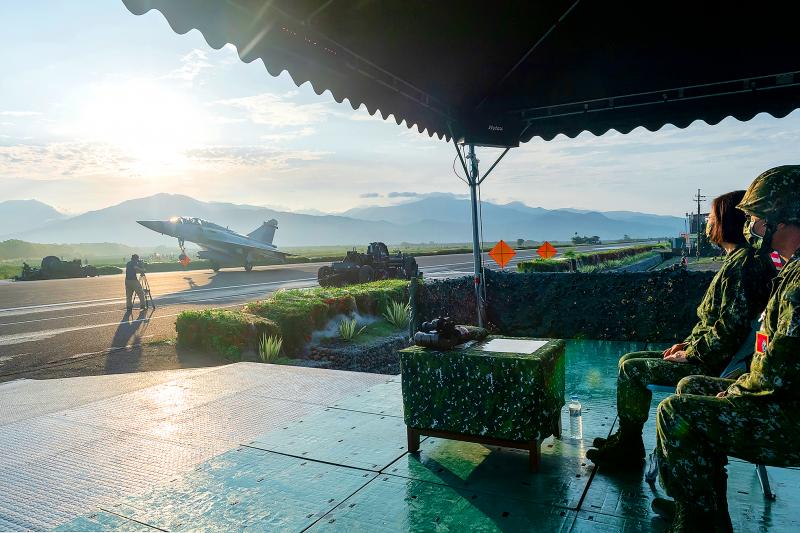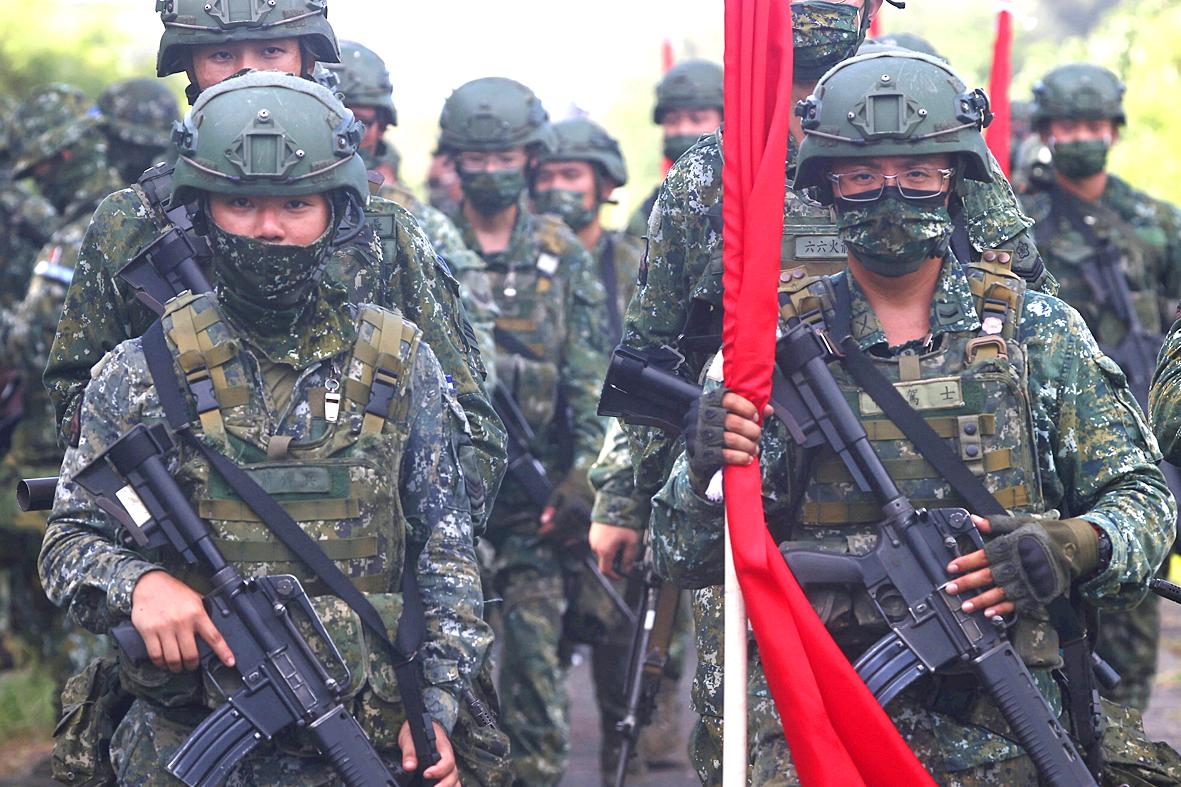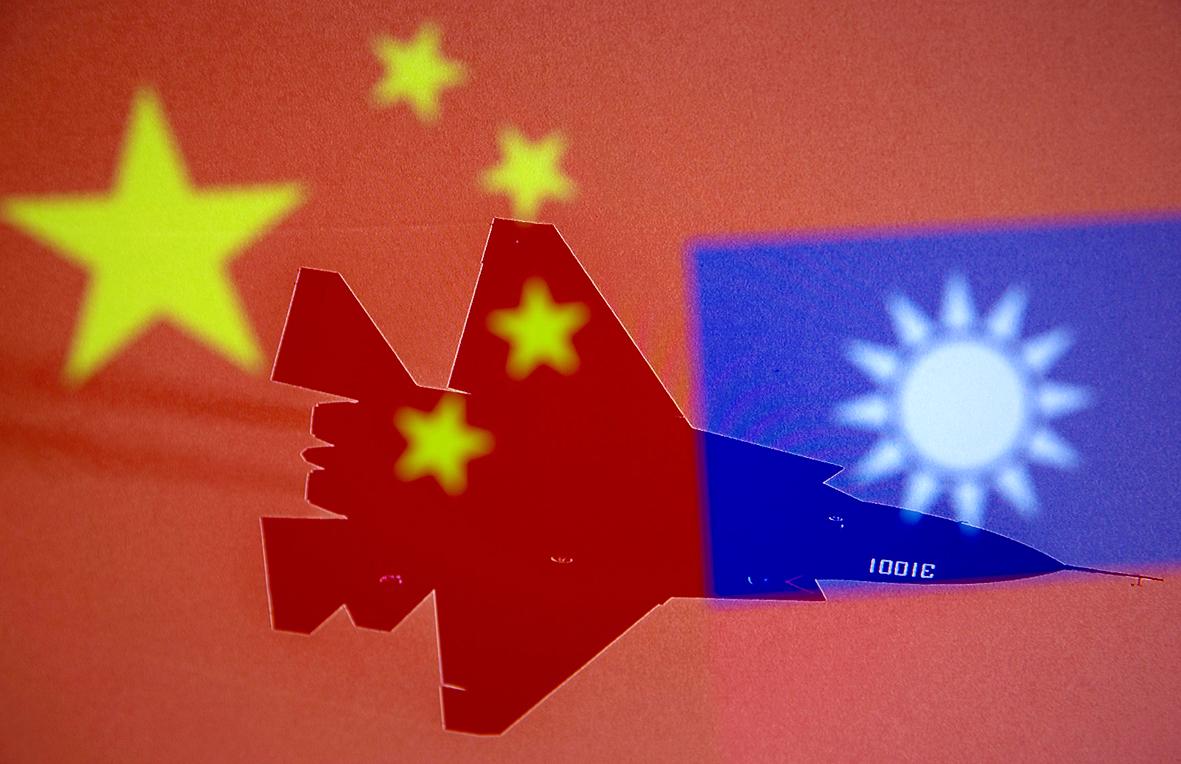Lately, as Beijing increases its threats, voices have begun arguing for Taiwan to increase the duration of conscription, or conscript everyone a la Israel or Switzerland.
These arguments are mere fantasies that there is an easy solution to the China threat, as if it will be scared off if our army is large enough. Indeed, it seems somehow a quintessentially Taiwanese solution: just add labor! Unfortunately, it isn’t what the nation needs.
Fundamentally, if a US-Japan alliance contest the air and sea space around Taiwan, then China cannot invade. At that point the size of the ground force on Taiwan wouldn’t matter. It would be superfluous.

Photo: AP
Conversely, imagine the situation in which China has defeated the combined might of the US and Japan at sea and in the air. It now controls the space around Taiwan and can land troops at will.
Even if every human in Taiwan were conscripted and trained as a soldier, the outcome would not be doubt. Control of the air (and sea) means eventual defeat for defending forces, if the attacker is willing to pay the price.
China would not even have to invade. There’s an old saying: amateurs study tactics, professionals study logistics.

Photo: Reuters
NUMBERS AREN’T THE ANSWER
Our reservists standing ready to fend off a Chinese invasion would have to be fed and clothed and armed. Fed? Taiwan imports something like 65 percent of its calories, but that number is deceptive. For example, on paper we are more than “self-sufficient” in seafood, but of course that involves ships going overseas, which they could not do in the face of Chinese sea control.
People often forget that our animal feed is also mostly imported. When COVID-19 hit last year, Argentina stopped shipping forage corn to Taiwan, which caused a food crisis among local pig farmers. Imagine if feed imports stopped completely under a Chinese blockade.

Photo: Reuters
Nor can Taiwan simply ramp up food production. According to a report on Taiwan’s food security from the Food and Fertilizer Technology Center for the Asian and Pacific Region, Taiwan’s Ministry of the Interior has targeted 800,000 acres for farm production, but only 520,000 are actually in production.
The report notes that massive investment in technology firms has left agriculture bereft of investment in capital and advanced technology. The labor force is small, and the farmers old. Poor storage and shipping management means that 40 percent of fruit and vegetable production is wasted. These problems cannot be changed overnight.
The food issue cannot be emphasized enough. Even if there is no blockade, in the event of war international shippers are going to demand astronomical rates for moving things to Taiwan, to pay their skyrocketing insurance costs.
Neither the US nor Japan possesses the sealift to simultaneously carry out operations in the Pacific and supply 23 million people in Taiwan with food. Food prices in Taiwan will spike, and the poorest will die, a scenario repeated in countless wars throughout history.
In other words, the best employment for the fantasy army of Taiwanese reservists would be as agricultural laborers. If the Chinese settle down to blockade and siege, then that is likely where most conscripts will wind up.
Further, Taiwan imports almost all of its oil and basic raw materials for chemical and metal production. It also imports much of its advanced machinery, and of course, large quantities of industrial labor. All of that would grind to a halt under a blockade.
Food aside, a large reserve call-up would face insuperable problems of finding housing and weapons for the soldiers, all of which would have to be stored against that terrible day. It would mean the maintenance of a large corps of officers to permanently staff skeleton divisions ready to be expanded at any moment. It would mean inexperienced officers carrying out the call-up for real for the first time ever as invasion looms.
It would also mean the militarization of society. I think we all know what that would do to Taiwan’s democracy.
CRITICAL INFRASTRUCTURE
But let’s imagine that this massive reservist force can somehow be sustained and deployed against an invading Chinese army. With control of the air, the attackers are bombing anything that moves on land, killing the island’s electricity production, wrecking (or threatening to) nuclear plants, bombing water systems, irrigation infrastructure and rail lines. Fighting is constant, in densely populated urban areas, where scraggly militias contend with well-armed professional soldiers.
Prolonged armed resistance would simply mean what we are now seeing in Afghanistan and a thousand other places throughout history: widespread starvation, the reappearance of deficiency diseases, the wrecking of need infrastructure and mass death, especially of non-combatants. What a massive reserve force really means is pyres of dead, to no good end.
Nor would our fantasy reservists stop the population transfers. Stalin forcibly moved whole ethnic populations while at war with Germany. So will Chinese President Xi Jinping (習近平). Those car ferries constructed to transport tanks and soldiers to Taiwan will not return empty. They will be filled with Taiwanese hostages.
If the Chinese achieve control of the air and sea around Taiwan, and it appears that the US and its allies will be unable to wrest it back, at that point the best option is probably not further resistance. Again, our reservists will be superfluous.
Places like Finland and Israel face significant threats from land. That is why they have a large force of trained reservists who can be called up in the event of invasion. The threat to Taiwan is an invasion across water. For that the best answer is a small, highly-trained and mobile professional force that can squash an invasion before it establishes a beachhead.
Instead of spending money on fantasy armies, Taiwan should be (and is) focusing on asymmetric warfare, on pumping up production of missiles, mines, drones, fast attack boats and on basics like constant training. It needs to be ramping up cooperation with the US and Japan and with eastern European countries. Like Taiwan, they face a giant, rapacious neighbor. They get it.
Maybe one glorious day they will be able to change western European minds, and we will be able to expand our sources of weapons and training, and grow our allies.
That would be a lot more useful than a massive reserve force.
Notes from Central Taiwan is a column written by long-term resident Michael Turton, who provides incisive commentary informed by three decades of living in and writing about his adoptive country. The views expressed here are his own.

Jacques Poissant’s suffering stopped the day he asked his daughter if it would be “cowardly to ask to be helped to die.” The retired Canadian insurance adviser was 93, and “was wasting away” after a long battle with prostate cancer. “He no longer had any zest for life,” Josee Poissant said. Last year her mother made the same choice at 96 when she realized she would not be getting out of hospital. She died surrounded by her children and their partners listening to the music she loved. “She was at peace. She sang until she went to sleep.” Josee Poissant remembers it as a beautiful

Before the last section of the round-the-island railway was electrified, one old blue train still chugged back and forth between Pingtung County’s Fangliao (枋寮) and Taitung (台東) stations once a day. It was so slow, was so hot (it had no air conditioning) and covered such a short distance, that the low fare still failed to attract many riders. This relic of the past was finally retired when the South Link Line was fully electrified on Dec. 23, 2020. A wave of nostalgia surrounded the termination of the Ordinary Train service, as these train carriages had been in use for decades

Lori Sepich smoked for years and sometimes skipped taking her blood pressure medicine. But she never thought she’d have a heart attack. The possibility “just wasn’t registering with me,” said the 64-year-old from Memphis, Tennessee, who suffered two of them 13 years apart. She’s far from alone. More than 60 million women in the US live with cardiovascular disease, which includes heart disease as well as stroke, heart failure and atrial fibrillation. And despite the myth that heart attacks mostly strike men, women are vulnerable too. Overall in the US, 1 in 5 women dies of cardiovascular disease each year, 37,000 of them

Politically charged thriller One Battle After Another won six prizes, including best picture, at the British Academy Film Awards on Sunday, building momentum ahead of Hollywood’s Academy Awards next month. Blues-steeped vampire epic Sinners and gothic horror story Frankenstein won three awards each, while Shakespearean family tragedy Hamnet won two including best British film. One Battle After Another, Paul Thomas Anderson’s explosive film about a group of revolutionaries in chaotic conflict with the state, won awards for directing, adapted screenplay, cinematography and editing, as well as for Sean Penn’s supporting performance as an obsessed military officer. “This is very overwhelming and wonderful,” Anderson